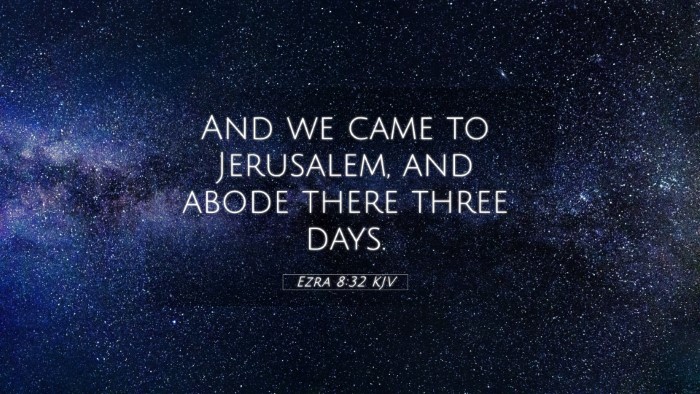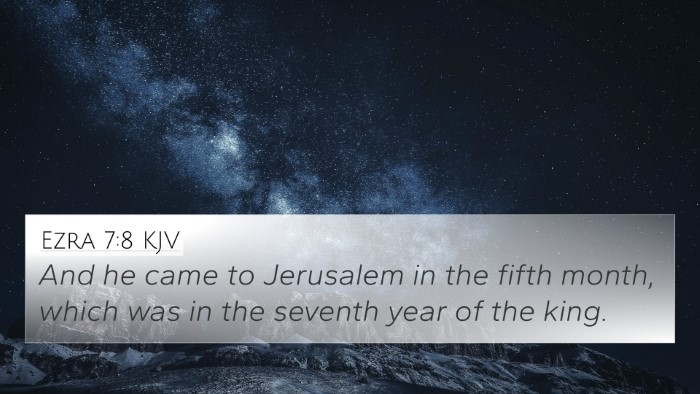Understanding Ezra 8:32
Ezra 8:32 is a significant verse that highlights the journey and dedication of the Israelites as they returned from Babylonian captivity to Jerusalem. This verse reads:
“And we came to Jerusalem, and abode there three days.” (Ezra 8:32, KJV)
This simple statement encapsulates a profound moment of transition for the Israelites, marking their return to their homeland after years of exile. The meaning of this verse can be best understood by examining its context and purpose within the narrative of Ezra. Below is a detailed exploration derived from public domain commentaries.
Contextual Analysis
The arrival of Ezra and the returning exiles to Jerusalem is not only a geographical relocation but also a theological and communal restoration. This journey signifies hope, renewal, and the renewal of the covenant between God and His people.
Insights from Commentaries
-
Matthew Henry Commentary:
Henry emphasizes the significance of their journey, noting that their arrival in Jerusalem was marked by spiritual readiness. The three days they spent in Jerusalem before undertaking any further actions suggests a time of waiting and preparation. It reflects the importance of seeking God’s guidance before embarking on a new phase in their communal life.
-
Albert Barnes Commentary:
Barnes highlights that the three-day pause indicates a moment for rest and reflection after a long journey. It signifies not just physical rest but a moment to regroup spiritually and prepare for the challenges of rebuilding Jerusalem and restoring worship.
-
Adam Clarke Commentary:
Clarke points out that the returning exiles had experienced considerable hardships and that their arrival was a fulfillment of God’s promise. He notes their dedication to God’s service upon their return, reinforcing the idea that their journey was as much about spiritual renewal as it was about physical restoration.
Cross-References and Thematic Connections
This verse connects with various other scripture passages that illuminate its themes of restoration, covenant, and divine guidance. Below are scriptural cross-references that relate to Ezra 8:32:
- Jeremiah 29:10-14: This passage includes God’s promise of restoration to His people after their exile.
- Isaiah 40:3: A prophecy that encourages the idea of preparing the way for the Lord among His people.
- Nehemiah 2:1-8: Nehemiah’s mission to Jerusalem, paralleling the efforts of Ezra in restoring the community.
- Psalm 126:1-3: A song of ascents celebrating the joy of returning to Zion after captivity.
- Haggai 1:1: A call to rebuild the temple in Judah, reflecting the ongoing theme of restoration following exile.
- Zechariah 1:16: God’s promise of returning to Jerusalem and rebuilding the city confirms His continual care for His people.
- Romans 12:1: The call to present our bodies as a living sacrifice upon spiritual renewal, akin to the Israelites preparing for worship in Jerusalem.
The Spiritual Significance of the Journey
The return of Ezra and the Israelites to Jerusalem symbolizes a transition from despair to hope. It reflects the overarching biblical narrative of God’s faithfulness to His promises, as highlighted in the aforementioned verses. The act of returning and spending time in Jerusalem before initiating action demonstrates a principle fundamental to the human experience—understanding where we come from before forging ahead into the unknown.
Conclusion
Ezra 8:32 offers rich insights into the themes of restoration, preparation, and divine guidance. The returning exiles' moment of pause allows for a deeper understanding of the covenant relationship between God and His people. As we reflect upon this scripture, we recognize the significance of both physical and spiritual journeys in our faith lives.
Further Study and Resources
To enhance your understanding and study of the Bible, consider utilizing tools and resources for cross-referencing, such as:
- Bible concordance
- Bible cross-reference guide
- Cross-reference Bible study
- Bible reference resources




